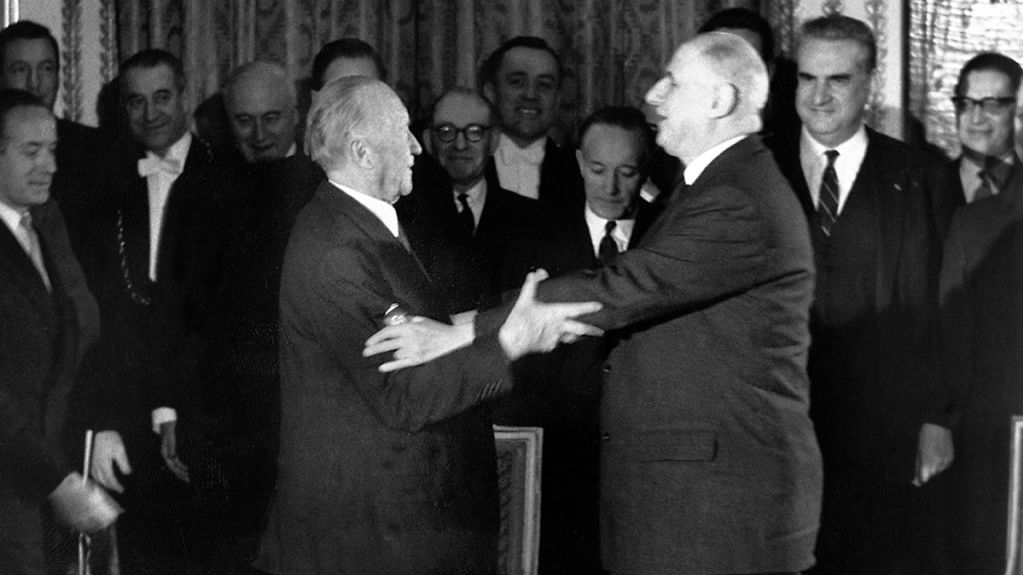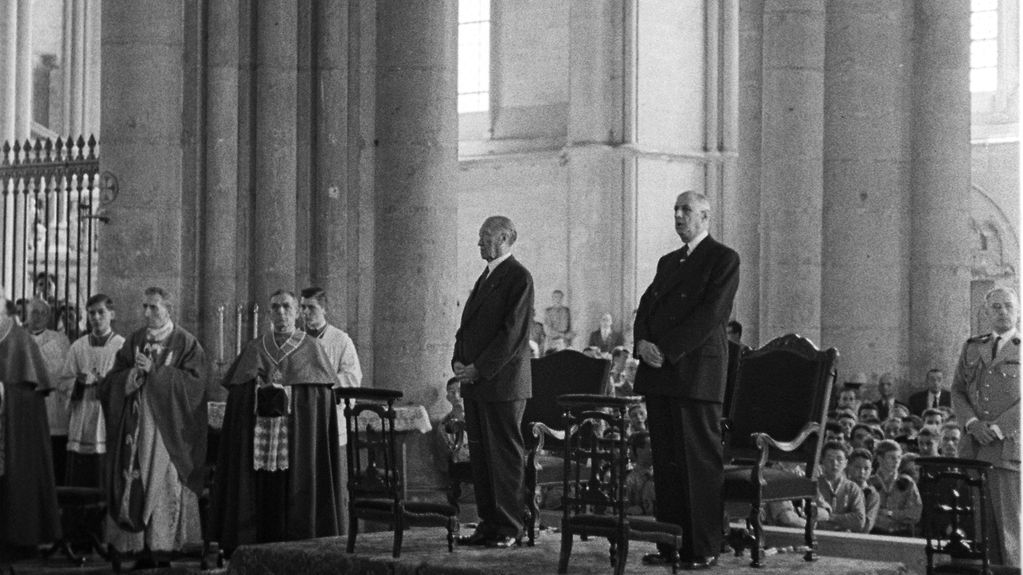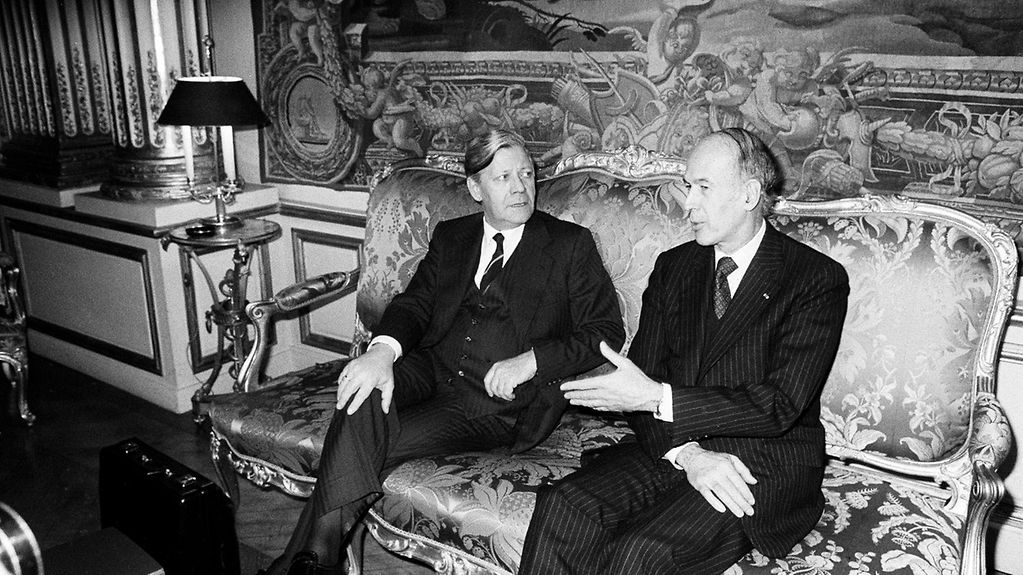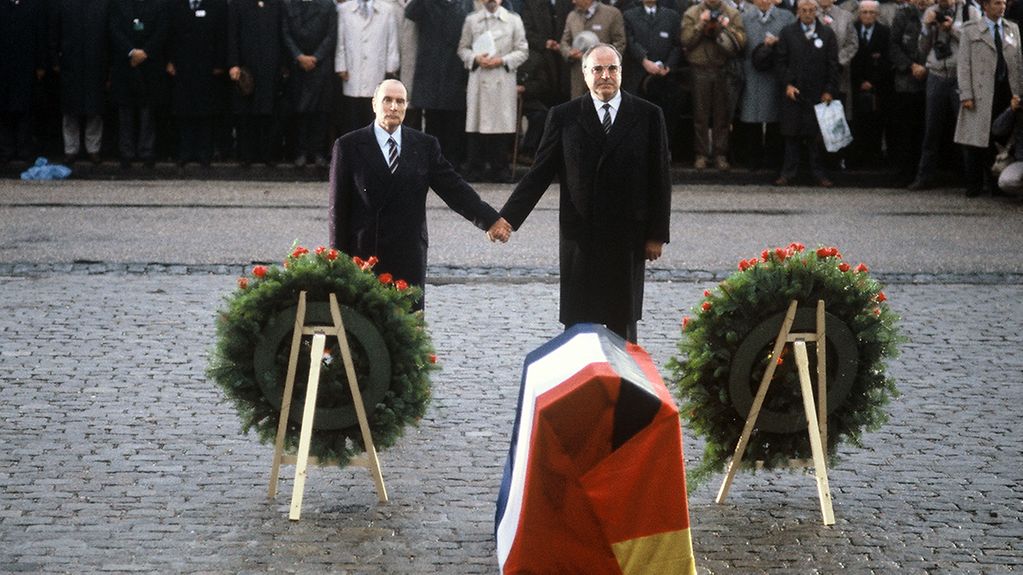German-French relations
Sixty years ago, Federal Chancellor Konrad Adenauer and President Charles de Gaulle sealed the friendship between Germany and France when they put their signatures to the Elysée Treaty. Since then, the treaty has been a symbol of the strong binational relationship in politics and society.
4 min reading time

Federal Chancellor Adenauer and President de Gaulle of France sign the Elysée Treaty on 22 January 1963.
Photo: Federal Government/Schwahn
In the 19th and 20th centuries, the relationship between Germany and France was marked by deep antagonism. A series of increasingly bellicose and political confrontations resulted in a long-lasting enmity between the two countries. Napoleon ruled over German territory until 1813. France’s defeat in the Franco-German War was followed by its humiliation when the new German Empire was proclaimed in Versailles in 1871.
The annexation of Alsace-Lorraine further humiliated France and prompted anti-German sentiment in the country.
An age of military confrontations
The ongoing antagonism between Germany and France, accompanied by dreadful miscalculations in the conflicting system of alliances, resulted in the First World War, in which Germany and its allies were defeated in 1918.
When Adolf Hitler’s Nazi Third Reich invaded Poland 21 years later, Great Britain and France declared war in September 1939. German troops occupied Paris and the northern half of France, while what was known as the Vichy government under Pétain collaborated with Hitler.
The Allies liberated France in 1944, after which Germany finally surrendered in May 1945.
The path to the Elysée Treaty
Immediately after the war, the idea that the two neighbours could be reconciled was unimaginable. However, when France’s then prime minister and later president, Charles de Gaulle, invited Germany's then Federal Chancellor Konrad Adenauer to his private country house, it was seen as a historic and unique gesture. The aim was to resume relations between France and Germany on the levels of culture, business and politics.
The process of bilateral conciliation became the driving force behind European unification and integration, which had begun with the signing of the Treaty of Rome and the founding of the European Economic Community in 1957.

Federal Chancellor Konrad Adenauer (l.) and President de Gaulle (r.) of France attend the mass for reconciliation in Reims Cathedral on 8 July 1962.
Photo: Federal Government/Steiner
In a moving mass for reconciliation celebrated in Reims cathedral – where French kings had been crowned for centuries – Adenauer and de Gaulle brought the German-French friendship into public view. From here, the two nations went on to sign the treaty of friendship in the Elysée Palace on 22 January 1963.
From the treaty of friendship to reconciliation
The signing of the Elysée Treaty was a milestone in European history. It laid the foundations for further European integration and close bilateral collaboration, and de Gaulle and Adenauer went down in history as the political masterminds of European reconciliation policy.
The Treaty included a consultation mechanism that required regular meetings at a political level. It also committed the governments to coordinate more closely on matters of foreign, European and defence policy, as well as on education and youth issues.
One example of this was the creation of the Franco-German Youth Office (FGYO). Since its foundation, the FGYO has made it possible for millions of children and young people from the two countries to take part in over 320,000 exchange programmes.
A partnership in a modern Europe
The Elysée Treaty was signed in the spirit of reconciliation and exchange, putting the seal on the friendship between Germany and France. From then on, the two countries and their citizens were expected to work together in a relationship based on trust. Since the signing of the treaty, a close political and friendly relationship has developed which is still focused on developing the European project.

Federal Chancellor Helmut Schmidt (l.) and French President Giscard d’Estaing in the Elysée Palace in 1978
Photo: Federal Government/Reinecke
In the 1970s, President Valéry Giscard d’Estaing and Federal Chancellor Helmut Schmidt campaigned for the creation of the European Council and a system of European currency for the European Community (EC). The two leaders also set up the annual World Economic Summit.

A sign of reconciliation on a former battlefield: on 22 September 1984 Federal Chancellor Kohl (r.) and President Mitterrand commemorate those who died in both World Wars in a ceremony at Verdun.
Photo: Federal Government/Schulze-Vorberg
German Reunification came about during a period of close collaboration between President François Mitterrand and Federal Chancellor Helmut Kohl.
Then as now, Germany and France intend to take joint responsibility and promote European integration. To this end, President Emmanuel Macron and Federal Chancellor Angela Merkel agreed in January 2018 to draw up a new treaty to mark the 55th anniversary of the signing of the original Elysée Treaty.
The Treaty of Aachen was signed in the Coronation Hall of Aachen Town hall in 2019 and supplements the Elysée Treaty.
To mark the 60th anniversary of the Elysée Treaty, Federal Chancellor Scholz will be joined in Paris by the whole Federal Cabinet. In addition to a meeting of the Franco-German Ministerial Council, ministers will hold bilateral talks with their respective counterparts. Speeches given by President Macron and Federal Chancellor Scholz at Sorbonne University in Paris will be a highlight of the anniversary.
The Treaty of Aachen aims to strengthen cooperation in economic integration and promote civil society partnerships between the two countries. It also provides for greater cooperation in foreign, defence, security and development policy. The Treaty of Aachen focuses on the global challenges of the 21st century and the competitiveness of the two countries. It also brings future issues such as climate action, the environment, health and sustainability to the fore.